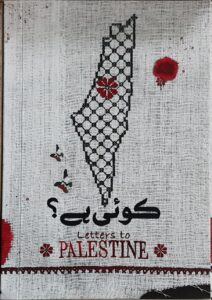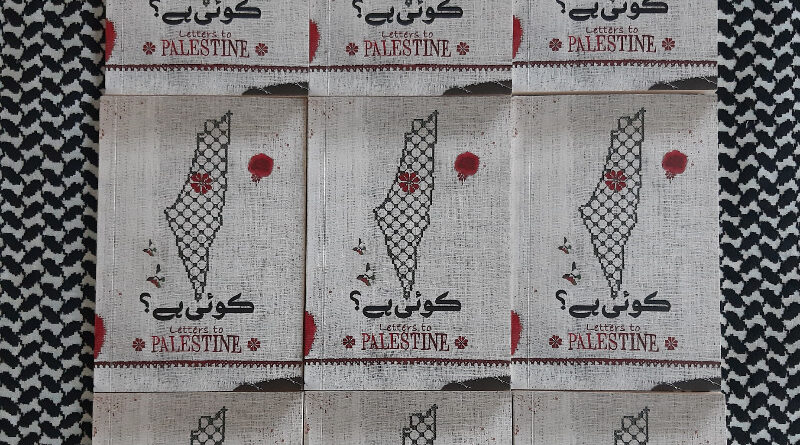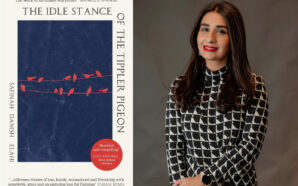Koi Hai – Letters to Palestine, an anthology comprising notes, letters, poetry, translations and illustrations was recently published in solidarity with the humans of Palestine, reinforcing the idea of peace, empathy and love. The project is spearheaded by publisher, Mehr F Husain. Koi Hai; meaning ‘Is anyone there?’ is collaboration between independent publishing house Zuka Books and global media platform Ananke.
Koi Hai’s print version has been published by Zuka Book and the ebook by Ananke. The latter can be viewed and read for free on the ISSUU platform with the option of downloading the entire document as well.
An initiative that answers the call for never stop talking about the sufferings of Palestinian people, it is a direct response to the Gazan appeal ‘Is anyone there?’ by primarily Pakistani writers and creators; also belonging to the diaspora.
Talking about the project, founder Zuka Books, Mehr Husain said during the print launch: “What convinced me of the necessity of taking such a stand were three things. One was a video of a Palestinian woman who cried out if anyone was there to help them – I couldn’t forget that cry. Then there is the brave young journalist, Motaz, who has been covering the genocide (through his social media platform), who recently asked if there is anyone who cares about them and if anyone thought about his feelings – I can’t imagine that state of isolation.”
At the digital launch of the ebook by Ananke, Mehr said: “The whole idea of this project is inclusivity. Contributors have poured their heart and soul in what has been shared with us and we need to highlight that. I also wanted to showcase original work coming out from Pakistan and the fact that we can tackle global issues without being hateful.”
Hailing the effort as groundbreaking, founder and executive editor, Ananke, Sabin Muzaffar said: “Being a part and partner of an initiative that shares and reinforces the message of humanity and compassion in this world – which has become so polarized, where hate, fear, prejudice fuels power and impunity – is not just a no-brainer, it is the medicine that can begin with healing all around the world. Perhaps efforts like Koi Hai can bring us closer together for it is through discourse, dialogue that we may be able to reimagine communication – a conversation. This collaboration gives me hope.”
 Contributors include not just globally respected names from the Pakistani literary community such as Fasi Zaka, Hammad H Rind, Safinah Danish Elahi and many more; but also aspiring writers as well as students.
Contributors include not just globally respected names from the Pakistani literary community such as Fasi Zaka, Hammad H Rind, Safinah Danish Elahi and many more; but also aspiring writers as well as students.
Sharing his thoughts, Hammad H Rind, a respected author and translator said: “My thoughts have lately been consumed by the harvest of the past few months, a grim chronicle initiated by Israel’s assault on Gaza. Thousands of lives, each bearing names, dreams, and futures, were extinguished within the cruel brevity of weeks, days, and hours. I’ve been pondering the role of a writer, a poet, in these trying times. How does one engage with poetry amidst the backdrop of death, disaster, and barbarity? A poignant line by Mahmoud Darwish echoes in my mind: “Against barbarity, poetry can resist only by cultivating an attachment to human fragility like a blade of grass growing on a wall as soldiers march by.”
He added: “Yet, in the midst of such adversity, the poets of Gaza persist. They continue to breathe new life into words like resistance, survival, and resilience. The voices and words emanating from Gaza inspire those in their midst and beyond. The poem by Gazan poet Refaat Alareer that I translated into Urdu and Persian commences with the hauntingly simple line, “If I must die.” This phrase, resembling a premonition or an acceptance of imminent death, is simultaneously stoic and heroic. It serves as the preamble to a dream, wherein Alareer envisions his belongings and spirit transforming into a kite, soaring into the Gazan sky, appearing as an angel to the children below. The poem culminates in a poignant plea: “Let it be a story, let it be hope.”
The book showcases submissions from Pakistan, the UAE, India, Pakistan and India. Poetic works from Palestine is articulately translated into Urdu, Seraiki, and Persian, painting a breathtaking collage. Cover has been designed by the illustrious Minhaj Ahmed Rafi, based in Pakistan.
Koi Hai – Letters to Palestine eBook can be read for free on the ISSUU platform with the option of downloading the entire document available.











